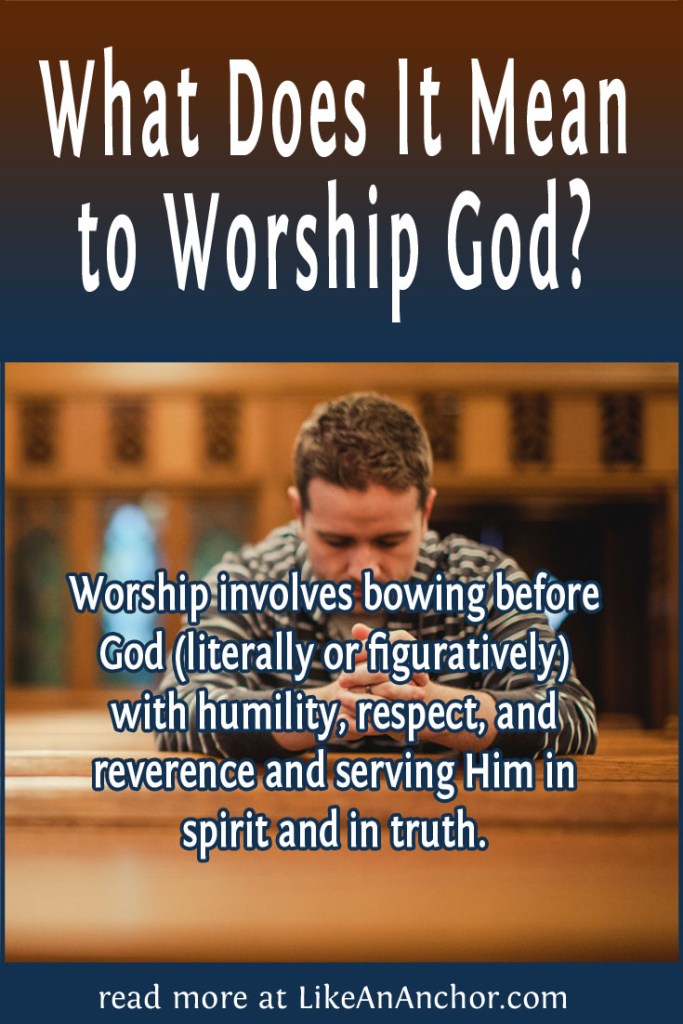Years ago when I first studied the topic of “praise,” I remember I immediately wanted to do a follow-up study on “worship.” That’s what I’m doing again this week. We often use “praise and worship” as a connected idea, almost as if they’re the same thing or they’re simply the label for the time during church services when we sing songs to God. But I remember from my last studies on worship that worship in the Bible is a different thing from praise. They can be connected, but they’re distinct ideas.
Praise, as we saw in last week’s post, involves acknowledgement of something God is or does. It includes the ideas of glorifying God, confessing His greatness, blessing and thanking Him, and lifting up His greatness and mighty deeds. In many cases, praise is public, communal, and enthusiastic. It often involves music and singing. Worship, on the other hand, involves bowing before God with humility, respect, and reverence as you offer service to Him. Praise and worship may occur together, but not necessarily.
Worship Words
As usual here on this blog, I like to start topical studies by looking at the Hebrew and Greek words used in the Bible. We’ll also compare them to the English definition, to see where there might be differences that could affect our understanding.
In English, “worship” as a noun means “the feeling or expression of reverence and adoration for a deity.” As a verb (action), it means “show reverence and adoration for (a deity); honor with religious rites” (Google and Oxford Languages). That matches the Hebrew and Greek meanings pretty well, but it’s missing a few points about how we show that reverence, adoration, and honor. We don’t really bow much anymore (at least in modern Western culture), but that sign of humble recognition that we’re entering the presence of someone far superior to us is key to understanding worship in the scriptures.
In Hebrew, “worship” is usually translated from sachah (H7812). This word appears 172 times in the Hebrew Bible, and you can translate it “bow down” or “worship.” Occasionally, English translators may use words like “obeisance” or “reverence” as well. Basically, the word means “to bow down, prostrate oneself” as “before a superior in homage” and “before God in worship” (Brown, Driver, Briggs [BDB]). Strangely (considering how much time they devote to words translated “praise”), the Theological Wordbook of the Old Testament (TWOT) has little to say about sachah. They simply say that the word can mean to “depress” or “weigh down” someone or something, as well as “‘to prostrate oneself’ or ‘to worship'” (TWOT 2360). The meaning seems to be fairly straightforward. There’s also a similar Chaldean word used in the book of Daniel that means to prostrate or “fall down” in worship (H5657; segid).
In the modern NET Bible, the translators sometimes render the Hebrew words abad (H5647; “serve” in KJV) and yare (H3372; “fear” in KJV) as “worship.” They’ll also translate whole phrases like “set their hearts to seek” or “call on the name” as “worship.” The NET isn’t my preferred translation for the Old Testament (I think they sometimes lose the important, poetic word pictures of Hebrew by reducing them to a single English word), but abad is an important word to look at when we’re studying worship. It blends the meanings of several roots, including “to do or make” and “to worship, obey” (TWOT 1553). It involves service offered to someone, often a king or deity. In a proper sense, it includes the “joyous and liberating experience” of serving the one true God (TWOT). Our worship can include obedient service as well as humble and reverent bowing before God.
In Greek, “worship” can be translated from a wide variety of different words. In the KJV, translators chose “worship” to represent all of these words: proskuneo (G4352; prostrate/worship), sebomai (G4576; revere/adore/worship), doxa (G1391; glory), latreuo (G3000; minister/serve), eusebeo (G2151; be pious toward/respect), therapeuo (G2323; wait upon, worship), threskeia (G2356] ceremonial observance/religion), and also a few single-use derivatives of those words (note: worship is not the only translation for most of these words [e.g. doxa is typically translated “glory”]). Most often (54 out of 73 verses), “worship” comes from proskuneo. The NET also translates these words as “worship,” and they translate latreuo as worship more often than the KJV does (which typically uses “service”).
Taking the Hebrew and Greek together, the ideas that come into the English language as “worship” typically involves either 1) prostration and bowing down before God, and/or 2) service given to God. It also includes nuances of respect, adoration, and reverence. With that background, let’s look at how these words (particularly the Hebrew sachah and abad and the Greek proskuneo and latreuo) are used by Bible writers.
Kneeling in Worship
The earliest record we have of worship comes from Abraham, the Friend of God (Isa. 41:8; Jam. 2:23). When “Yahweh appeared to” Abraham before the destruction of Sodom and Gomorrah, Abraham “ran to meet them from the tent door, and bowed himself to the earth” (Gen. 18:1-2, WEB). Here, “bowed himself” is translated from sachah. Abraham also used this word when God commanded him to sacrifice Isaac, explaining to his servants, “We will worship, and come back to you” (Gen. 22:5, WEB). Just in these examples, we see that worship involves humility, respect, and actions that serve God obediently. Sachah may involve literal bowing, but not always.
Oh come, let’s worship (sacha) and bow down (kara).
Psalm 95:6-7
Let’s kneel (barak) before Yahweh, our Maker,
for he is our God.
We are the people of his pasture,
and the sheep in his care.
Here, “worship” is translated from sachah. It’s paired with kara (H3766) and barak (H1288). Kara specifies literal bending and bowing. It’s used 36 times in scripture, and at least 13 are for bowing to the knees and bending the back in worship (TWOT 1044). Barak is one of the words that we looked at last week; it is more typically translated “bless” and can be translated “praise” in some contexts. The use of these three words together makes it clear sachah isn’t always synonymous with kneeling (there wouldn’t be need for another word to clarify it if that was the case). Worship always involves the attitude of humbly prostrating oneself before God, but doesn’t always mean literally falling to your knees (though it can and often does include that).
Like Hebrew, Greek also has separate words for “bow/kneel” than the word for “bow/worship.” One of them is kampto (G2578), which Paul uses to talk about one of his prayers (Eph. 3:14-19) and to express the proper reaction people should have–and eventually all will have–to Jesus the Messiah.
As a result God highly exalted him
Philippians 2:9-11, NET
and gave him the name
that is above every name,
so that at the name of Jesus
every knee will bow (kampto)
—in heaven and on earth and under the earth—
and every tongue confess
that Jesus Christ is Lord
to the glory (doxa) of God the Father.
You’ll see something similar in the gospels, too, where people “bow down” and “worship” Jesus. The same thing is happening before God’s throne in heaven (Matt. 2:11; Rev. 5:14; 19:4). In these verses, the words are pipto (G4098; literally “fall down”) and proskuneo (G4352; worship). Zodhiates says that proskuneo comes from a root meaning to kiss, which references an “ancient oriental mode of salutation … when one was much inferior, he fell upon his knees and touched his forehead to the ground or prostrated himself, throwing kisses at the same time toward the superior” (The Complete Wordstudy Dictionary: New Testament, entry 4352). This isn’t necessarily literally happening in the New Testament (though, as we’ve seen, people do fall down or bow before God as well as worship), but it’s a custom underlying the action of showing reverence, adoration, and worship to a deity.
Service As Worship
31 times in the Old Testament, you’ll find sachah and abad in the same verse. Over and over again, God’s people are warned not to bow down to, worship, or serve any other gods (Ex. 20:5; Deut. 11:16; 2 Kings 17:34-35). Doing so violates the covenant ancient Israel made with Yahweh (Josh. 23:16; Jer 22:9). Jesus reiterated the importance of worshiping and serving God alone during His confrontation with Satan following His baptism.
Again, the devil took him to a very high mountain, and showed him all the kingdoms of the world and their grandeur. And he said to him, “I will give you all these things if you throw yourself to the ground and worship me.” Then Jesus said to him, “Go away, Satan! For it is written: ‘You are to worship the Lord your God and serve only him.’”
Matthew 4:8-10, with a quotation from Deut 6:13
Here, because Jesus is quoting from the Old Testament, we can see how he aligned the Hebrew and Greek words for worship. We’re to worship (Greek proskuneo; Hebrew yare) God and serve (Greek latreuo; Hebrew abad) Him. Like the Hebrew abad, the Greek verb latreuo (noun form latreia) involves serving someone greater than you. The root word means “one hired,” indicating this service is voluntary and involves some kind of reward. When worshipping God, it’s not a transactional hiring process, but there are great rewards for those who faithfully serve Him.
Therefore I exhort you, brothers and sisters, by the mercies of God, to present your bodies as a sacrifice—alive, holy, and pleasing to God—which is your reasonable service (latreia).
Romans 12:1, NET
Presenting our entire lives to God as if we’re serving in His temple offering ourselves as a sacrifice to Him is a reasonable service. Reading Hebrews can provide a fascinating study of latreuo. It’s used of temple service under the Old Covenant, which was commanded as part of worshiping God but couldn’t make the worshippers perfect the way that Jesus’s sacrifice does (Heb. 9:1, 6, 9; 10:2). Because of what Jesus did, “the blood of Christ” cleans “your conscience from dead works to serve the living God” (Heb. 9:14, WEB). I said earlier this service isn’t a transactional hiring process, but it is a reciprocal relationship. When we accept Jesus’s sacrifice, we’re supposed to respond with worship and service.
So since we are receiving an unshakable kingdom, let us give thanks, and through this let us offer worship (latreuo) pleasing to God in devotion and awe. For our God is indeed a devouring fire.
Hebrews 12:28-29, with a quotation from Deut 4:24; 9:3.
The Bible gives us a few concrete examples of what this service looks like. Anna the prophetess served God by staying in the temple, fasting, and praying (Luke 2:36-37). Paul served God by following Jesus, believing in the law and the prophets, worshiping in the spirit, and preaching the gospel (Acts 24:10-14; Rom. 1:9; Phil. 3:3). Serving God voluntarily and wholeheartedly is a key aspect of how we worship Him.
Spirit and Truth
Returning to the Greek word most often translated worship, proskuneo (G4352), we can fill in a little more of our picture of what it means to worship. In the gospels, people worshiped when they learned that Jesus is the Messiah (Matt. 2:1-2, 11; 14:33; John 9:38). People also worshiped when they ask Jesus for something (Matt. 8:2; 9:18; 15:25). We can continue both these practices today, worshiping Jesus and the Father as we recognize who they are and what they do, and also approaching them with our requests in a humble, worshipful way.
“But a time is coming—and now is here—when the true worshipers will worship the Father in spirit and truth, for the Father seeks such people to be his worshipers. God is spirit, and the people who worship him must worship in spirit and truth.”
John 4:23-24, NET
This conversation that Jesus has with a Samaritan woman is probably the most direct discussion anyone in the Bible has about how we’re supposed to worship. Most of the time, we see examples of people worshipping or instruction to worship God without a specific explanation of how to do that. Here, Jesus gives us a “must” statement for how we need to worship God.
Thoroughly examining what it means to do something in spirit and truth could fill at least one more whole blog post. But I think the easiest way to understand it is to think about Paul’s letters that contrast walking in the flesh to walking in the spirit (e.g. Romans 8). Lives transformed by God are spirit-led, and that should affect our worship as well. For the “truth” aspect, I think of the letter where Paul said we should be “practicing the truth in love” (Eph. 4:15, NET). In this passage, truth is a verb. We don’t think of “truthing” as an action in English, but it is here. The NET notes that we can think of it as “being real or truthful in both conduct and speech” (footnote on Eph. 4:15).
Worship involves bowing before God (literally or figuratively) with humility, respect, and reverence. It also involves the service that you offer to Him. All of this must be done in spirit and in truth for it to qualify as true worship in our New Covenant relationship with God the Father and Jesus the Son.
Featured image by Pearl from Lightstock
Song Recommendation: “Here I Am To Worship” by Hillsong Worship





